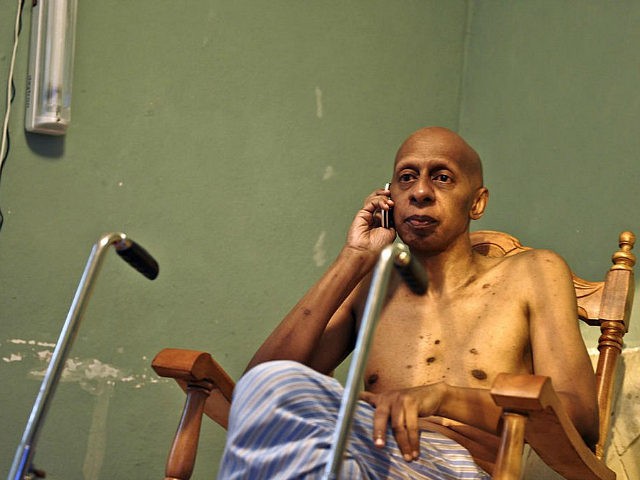At least 22 Cuban human rights advocates are currently undergoing hunger strikes nationwide, while the most prominent among them, EU Sakharov Prize winner Guillermo Fariñas, refuses hospitalization on day 17 of his 24th such hunger strike.
Fariñas is refusing to eat or drink water and has been hospitalized twice so far — once two weeks ago, once last week — and injected with water through an IV until regaining consciousness. He insists he will continue his hunger strike until Raúl Castro publicly vows to end violence against anti-communist dissidents or Fariñas dies.
Fariñas last underwent a hunger strike in 2010 to protest the death of political prisoner Orlando Zapata Tamayo, who died on his 85th day enduring a hunger strike. Doctors and fellow activists have repeatedly told Fariñas he faces unique dangers due to the damage the other 23 hunger strikes have leveled on his body, but he has refused to end his strike. He lasted 100 days on his last hunger strike before calling it off.
“He is dehydrated, with a slightly fast heartbeat, low temperature,” his doctor, Yorkis Rodríguez Cárdenas, told the Spain-based Diario de Cuba. “His life is in danger, he is doing very badly,” she noted.
After being released from his first stint in the hospital during this latest strike, Fariñas made clear that he has repeatedly refused medical attention. “I am not being hospitalized by my will, I am protesting, when I lost my consciousness they took me to the hospital,” Fariñas asserted through his organization, the United Antitotalitarian Forum (FANTU).
He admitted on day 13 of his strike, however, that he was already too weak to bathe himself and spent most of the day sleeping.
Fariñas began his latest hunger strike in late July after being beaten by Cuban state police for inquiring about the status of a fellow dissident, Carlos Amel Oliva. Fariñas said he was beaten and tortured, with police pulling his tongue out “until it turned black.”
In beginning his strike, he penned an open letter to Raúl Castro calling for an end to the wave of “abuse, terror, and violence by the repressive authorities of your government” that has grown increasingly dangerous for dissidents since President Barack Obama announced his “normalization” concessions to the Castro regime in December 2014. In subsequent interviews, Fariñas explained he was compelled to commit to the strike because of the mistreatment he received despite being an internationally-recognized peace activist: “if they are capable of beating me like this, what are they going to do to the others?” he asked.
Fariñas is not alone this time. According to the Spanish newspaper El Mundo, there are at least 21 other dissidents undergoing hunger strikes throughout Cuba, including Oliva, who is currently on day 30 of his. Oliva was hospitalized on day 25 and, upon his release, committed to expand his hunger strike to include water in solidarity with Fariñas.
Another hunger striker, Zulma López, was filmed being hauled out of her home, unconscious, by emergency medical workers on Monday.
#SOS Trasladan de urgencia a hospital los huelguistas de #UNPACU Zulma Lopez y Laudelino Rodriguez #Cuba #juntoacoco pic.twitter.com/zTuYxv11Mt
— Cristian Crespo F. (@cristiancrespoj) August 7, 2016
Cuban human rights activists have a long history of using hunger strikes as a peaceful means of protesting the communist dictatorship. The Cuban government has previously violated those rights, most recently last year against protester Vladimir Morera Bacallao. Morera Bacallao’s hunger strike ended when the government force-fed him upwards of 85 days into his strike. The United Nations considers the force feeding of hunger strikes a violation of the human rights of the striker and the integrity of his or her body, though it has only vocally condemned feeding hunger strikers in the case of terror suspects detained in America’s prison facility at Guantánamo Bay.

COMMENTS
Please let us know if you're having issues with commenting.